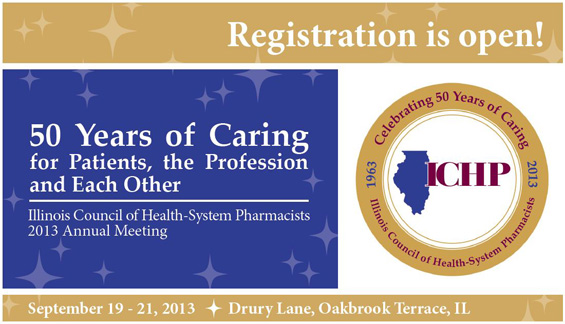Print Entire Issue
How's this for an ICHP Throwback?For more historical ICHP photos, be sure to check out our
Pharmacy Legislative Day 2005!To keep up with current legislation, check
ICHP Members taking in a Peoria Chiefsgame, an event hosted by the ICHP
Central Region
For more events, check out
![]()
KeePosted Info
Features
History of Organized Hospital Pharmacy In Illinois: The 1970s
Congratulate ICHP on 50 Years
Meet Cassidy McDonald
Meet Jamie Tidaback
Register Now for the 2013 Annual Meeting
Join Us for the Residency Showcase!
Columns
President's Message
Directly Speaking
Board of Pharmacy Update
Medication Safety Pearl
ICHPeople
The GAS From Springfield
New Practitioners Network
College Connections
Welcoming Midwestern University’s ICHP E-Board!
Student Leadership Development at ASHP 2013 Summer Meeting
Practice Makes Perfect
What…Canines are on Campus!?
More
Officers and Board of Directors
Welcome New Members!
ICHP Pharmacy Action Fund (PAC) Contributors
Upcoming Events
KeePosted Info
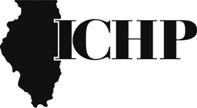 Illinois Council of Health-System Pharmacists
Illinois Council of Health-System Pharmacists
4055 North Perryville Road
Loves Park, IL 61111-8653
Phone: (815) 227-9292
Fax: (815) 227-9294
www.ichpnet.org
KeePosted
Official Newsjournal of the Illinois Council of Health-System Pharmacists
EDITOR
Jacob Gettig
ASSISTANT EDITOR
Jennifer Phillips
MANAGING EDITOR
Scott Meyers
ASSISTANT MANAGING EDITOR
Trish Wegner
DESIGN EDITOR
Amanda Wolff
ICHP Staff
EXECUTIVE VICE PRESIDENT
Scott Meyers
VICE PRESIDENT - PROFESSIONAL SERVICES
Trish Wegner
DIRECTOR OF OPERATIONS
Maggie Allen
INFORMATION SPECIALIST
Heidi Sunday
CUSTOMER SERVICE AND
PHARMACY TECH TOPICS™ SPECIALIST
Jo Ann Haley
ACCOUNTANT
Jan Mark
COMMUNICATIONS MANAGER
Amanda Wolff
LEGISLATIVE CONSULTANT
Jim Owen
ICHP Mission Statement
Advancing Excellence in the Practice of Pharmacy
ICHP Vision Statement
ICHP dedicates itself to achieving a vision of pharmacy practice where:
- Pharmacists are universally recognized as health care professionals and essential providers of health care services.
- Patients are aware of the training, skills, and abilities of a pharmacist and the fundamental role that pharmacists play in optimizing medication therapy.
- Formally educated, appropriately trained, and PTCB certified pharmacy technicians manage the medication distribution process with appropriate pharmacist oversight.
- Pharmacists improve patient care and medication safety through the development of effective public policies by interacting and collaborating with patients, other health care professionals and their respective professional societies, government agencies, employers and other concerned parties.
- Evidence-based practices are used to achieve safe and effective medication therapies.
- There are an adequate number of qualified pharmacy leaders within the pharmacy profession.
- Pharmacists take primary responsibility for educating pharmacy technicians, pharmacy students, pharmacist peers, other health professionals, and patients about appropriate medication use.
KeePosted Vision
As an integral publication of the Illinois Council of Health-System Pharmacists, the KeePosted newsjournal will reflect its mission and goals. In conjunction with those goals, KeePosted will provide timely information that meets the changing professional and personal needs of Illinois pharmacists and technicians, and maintain high publication standards.
KeePosted is an official publication of, and is copyrighted by, the Illinois Council of Health-System Pharmacists (ICHP). KeePosted is published 10 times a year. ICHP members received KeePosted as a member benefit. All articles published herein represent the opinions of the authors and do not reflect the policy of the ICHP or the authors’ institutions unless specified. Advertising inquiries can be directed to ICHP office at the address listed above. Image disclaimer: The image used in the Pharmacy Tech Topics advertisement is the property of © 2013 Thinkstock, a division of Getty Images.
Copyright © 2013, Illinois Council of Health-System Pharmacists. All rights reserved.
Features
History of Organized Hospital Pharmacy In Illinois: The 1970s
Editor’s Note: The June/July Keep Posted brought readers through the history of organized hospital pharmacy in Illinois to 1969.
Stabilization
The early 70s seemed to be a period of stabilization. As of January 1, 1970, the treasurer’s report showed total assets at $2,657.33. A proposed budget decreased the assessment for affiliated chapters from $2 to $1.50 per active member. Affiliated chapters were expected to pay for their own mailings so that an anticipated mailing expense for the sum of $180 was deleted from the budget proposal, and expenses for conference calls were increased to $100. There was a request to reimburse the Councils representative to the IPhA Board of Directors; however, “It was noted that none of the members of the IPhA Board of Directors is so reimbursed; such expenses are considered part of the responsibilities of the position. It was agreed that the Council adopt the same position regarding reimbursement.”
At this time the Council was beginning to see the fruits of some of its earlier efforts. Mr. Louis Gdalman was appointed as the first hospital pharmacist to serve on the Illinois State Board of Pharmacy. One of the other early leaders in Illinois hospital pharmacy Mr. Herbert S. Carlin was exercising leadership as president of the American Society of Hospital Pharmacists.
In the January 21, 1970 minutes, Secretary John Lewis noted, “Letters from Senator Ralph Smith and from the postmaster general indicated that the proposed stamp (for the sesquicentennial of the USP) is on the agenda of the Citizens Stamp Advisory Committee.” Correspondence from ASHP to the Mississippi Valley Hospital Pharmacists Association regarding affiliation indicated that the Council could not accept MVPHA as an affiliate since at least some of its members practiced in Iowa. The Council, in a communication to MVPHA, indicated the same while offering to cooperate in areas as feasible. ASHP also reminded all affiliated chapters that they are to forward any revisions of constitutions and bylaws along with a letter explaining the changes: “The secretary was directed to bring the Council’s Constitution and Bylaws up to date, to send a copy to the ASHP with a letter explaining the recent change allowing IPhA representation on the Council, and to circulate to all past and present members of the Council the latest Constitution and Bylaws.”
The Council voted to “support the modifications recommended by the ASHP delegates to the APhA House of Delegates regarding the APhA Provisional Policy Statement on Employment Standards.” The Council minutes commented, “The question before us is not whether unionism will arrive in pharmacy, but rather will we be adequately prepared to meet it on our own terms when it does arrive.”
Another issue that runs through several sets of minutes in 1970 is the status within the Council od the IPhA Director-at-Large for Hospital Pharmacy. The September 19, 1970 minutes stated the minority and majority positions on this issue. The minority view held “that this person does not represent the Council in any capacity to the IPhA, but rather Illinois hospital pharmacists in general. It was noted that the Council presents nominations to the IPhA in an advisory capacity.
The history of the position shows that the original liaison appointee to IPhA did not have a vote on the IPhA Board of Directors. Since IPhA does not recognize delegates from specialty organizations, IPhA agreed to a voting hospital pharmacist position on the Board of Directors only if the candidate ran at large. The majority position was that the Director at Large position was a direct descendant of the original liaison, which was between ICHP and IPhA. Thus, the Director at Large should also represent the Council’s viewpoint. It was further pointed out that the reciprocal position from the IPhA to ICHP represents the IPhA viewpoint.” By the July 7, 1971 meeting, chairperson Weldon Johnson had prepared a letter for IPhA outlining the duties and responsibilities of this person according to the majority viewpoint.
The Council also interacted with drug manufacturers. “The secretary was directed to send a letter to Roche Laboratories commending them for the elimination of their sampling program, and that a copy of this letter be sent to the Pharmaceutical Manufacturers Association, with a cover letter urging the PMA to take a position encouraging similar action on the part of its members.” It was in the early 70s that consideration was given to having a drug manufacturer conduct the next seminar under the banner of the Council with recognition of the sponsoring company. “The main caution to this proposal was that the Council be careful not to lose control of the program content, as the content is what will draw registrations.”
- Sister Mary Louise Degenhart
ICHP Historian
Congratulate ICHP on 50 Years
Celebrate with us
The Illinois Council of Health-System Pharmacists (ICHP) is celebrating 50 years of caring for patients, the profession, and each other during 2013! To honor this momentous milestone, ICHP’s celebrations will culminate with a gala on Friday, September 20, 2013 (in conjunction with the 2013 ICHP Annual Meeting).
We invite you to celebrate with us and congratulate ICHP on their 50th Anniversary by purchasing an ad in the gala program book! Available ad space is noted below.
Ads for Gala Program Book
Only the cover of the program book will be in color. The inside pages will be printed in black and white.
Inside Back Cover (color) 5.5”w x 8.75”h $400
Full-page (black & white) 5.5”w x 8.75”h $200
Half-page (black & white) 5.5”w x 4.375”h $100
Quarter-page (black & white) 2.75”w x 4.375”h $50
- Complete and e-mail the Gala Program Book Ad Form to AmandaW@ichpnet.org or fax to the ICHP office at 815-227-9294
- E-mail camera-ready display ads or text-only ads by August 16, 2013 to AmandaW@ichpnet.org
- PDF is the preferred file format for display ads
- Text-only ads may be sent in Word
- Ads are non-commissionable
- Specified location ads will be based on first-come, first-serve basis (with payment)
Thank you for being an ICHP member, and we look forward to celebrating with you on Friday, September 20, 2013!
Meet Cassidy McDonald
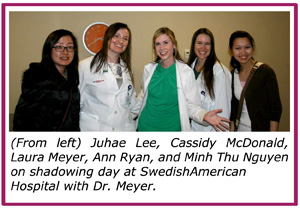 Hi, my name is Cassidy McDonald, and I am currently a fourth year pharmacy student at University of Illinois College of Pharmacy at the Rockford campus. I am from Ottawa, Illinois, which is an hour south from Rockford. I completed my pre-pharmacy coursework at Illinois Valley Community College. I then moved on to complete my Bachelor’s degree in Biological Sciences at Northern Illinois University. Throughout my undergraduate studies, I worked as a Pharmacy Technician at CVS Pharmacy. Once I was accepted to pharmacy school, I was offered a student position at OSF St. Elizabeth Medical Center in Ottawa.
Hi, my name is Cassidy McDonald, and I am currently a fourth year pharmacy student at University of Illinois College of Pharmacy at the Rockford campus. I am from Ottawa, Illinois, which is an hour south from Rockford. I completed my pre-pharmacy coursework at Illinois Valley Community College. I then moved on to complete my Bachelor’s degree in Biological Sciences at Northern Illinois University. Throughout my undergraduate studies, I worked as a Pharmacy Technician at CVS Pharmacy. Once I was accepted to pharmacy school, I was offered a student position at OSF St. Elizabeth Medical Center in Ottawa.
My first advanced pharmacy practice experience is at the Illinois Council of Health-System Pharmacists' headquarters, which is an advanced specialty elective. Jamie Tidaback and I worked closely together at CVS Pharmacy. When we were choosing our elective sites, we chose this rotation together. I chose this rotation, purely because I wanted to challenge myself – I never pictured myself as a writer or being involved with the creation of CE Programs, for example. I knew I needed to pick rotations that would take me out of my comfort zone and put me in a position where I could learn a lot and be a part of something I never imagined, which is what I have already done being here at the ICHP headquarters for only one week. My duties will consist of lobbying activities, writing a career center article, journal club, reading the new draft of the Pharmacy Practice Act, CE program entries, grading Pharmacy Tech Topics™ tests, attending the Pharmacy Directors’ Network dinner, a Champion Webinar, committee meetings, an ICHP Board of Directors meeting, assisting in planning for the 2013 ICHP Annual Meeting and 50th Anniversary Gala, and assisting in and attending the ICHP Student Leadership Retreat at Midwestern University.
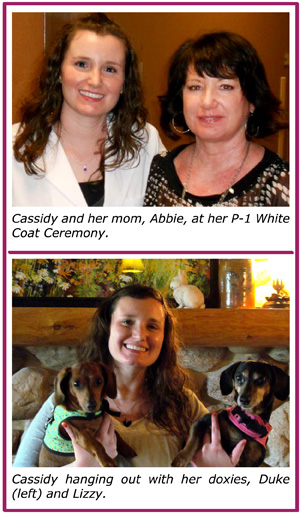 When I am not studying for exams or preparing for a presentation, I love to spend time with my family and friends. My hobbies include hiking, walking, shopping, traveling, baking, and volunteer activities. I have two dachshunds, Lizzy and Duke, and I love spending time and traveling with them.
When I am not studying for exams or preparing for a presentation, I love to spend time with my family and friends. My hobbies include hiking, walking, shopping, traveling, baking, and volunteer activities. I have two dachshunds, Lizzy and Duke, and I love spending time and traveling with them.
I will be doing an advanced medicine rotation for my next module, which will be the Emergency Department at Swedish American Hospital. I look forward to working closely with a variety of pharmacists and will embrace all of my opportunities to come!
Meet Jamie Tidaback
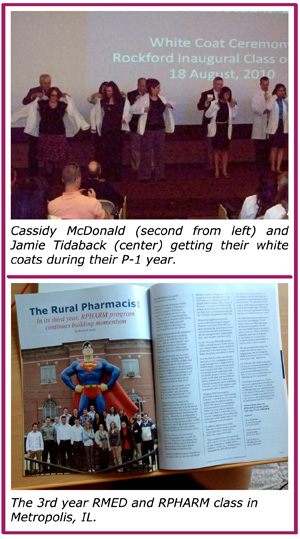 Hi, my name is Jamie Tidaback and I’m a P-4 student at the University of Illinois at Chicago (Rockford campus). I was born in Mississippi and lived there for 10 years before moving to Spring Valley, Illinois. I graduated from Hall High School in 2005 and continued my education at Illinois Valley Community College (IVCC), where I completed my pharmacy pre-requisites. After IVCC, I commuted to Northern Illinois University to receive my Bachelor’s degree in Biological Sciences. I graduated from NIU in 2010. Since 2006, I’ve been a pharmacy technician for CVS/Pharmacy in Peru, Illinois. In my free time, I volunteer for my local March of Dimes chapter, have coached girls’ softball, and spend time with my two wonderful black Labradors. I enjoy watching movies and sports (go Cubs go!), as well as participating in sporting events.
Hi, my name is Jamie Tidaback and I’m a P-4 student at the University of Illinois at Chicago (Rockford campus). I was born in Mississippi and lived there for 10 years before moving to Spring Valley, Illinois. I graduated from Hall High School in 2005 and continued my education at Illinois Valley Community College (IVCC), where I completed my pharmacy pre-requisites. After IVCC, I commuted to Northern Illinois University to receive my Bachelor’s degree in Biological Sciences. I graduated from NIU in 2010. Since 2006, I’ve been a pharmacy technician for CVS/Pharmacy in Peru, Illinois. In my free time, I volunteer for my local March of Dimes chapter, have coached girls’ softball, and spend time with my two wonderful black Labradors. I enjoy watching movies and sports (go Cubs go!), as well as participating in sporting events.
In 2010, I was accepted into the first class for UIC’s Rockford campus. Being part of the first class has definitely had its ups and downs, but some of the perks of being on a brand new campus is brand new equipment and let’s not forget – free lunches! All and all, my time in Rockford has been a positive experience that I would not trade for the world. While at UIC-Rockford, I have been involved in the Student National Pharmaceutical Association (SNPhA), and served as fundraising chair for the 2012-13 school year, and the Rural Pharmacy Program (RPHARM). The RPHARM students work alongside the Rural Medical Education Program (RMED) students and in our 4th year, one pharmacy student and one medicine student will complete a community project in an assigned rural area. Max Busch, my RMED partner, and I will be completing our community project in Princeton, Illinois. Our project will include 5th graders from a local grade school and we will be educating them on healthy lifestyle choices for 12 weeks. This project will begin in the spring of 2014.
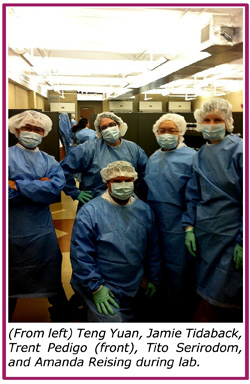
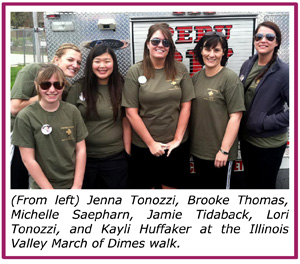 So, why are you reading this in ICHP’s KeePosted newsjournal? Well, for my first rotation I selected to complete six weeks at the ICHP headquarters in Loves Park, Illinois. My preceptor is Scott Meyers and I’m also working with another student from the UIC-Rockford campus, Cassidy McDonald. I chose this rotation because I wanted something that was out of my comfort zone. Honestly, I’m not very familiar with a lot of legislative material, so I wanted to see what I could pick up on and become more comfortable with this topic in pharmacy. So far, the staff is very friendly and welcoming and always willing to explain how something is done. I look forward to attending Board meetings, planning for ICHP’s 50th Anniversary, and any other behind-the-scenes action that ICHP has to offer. I feel that I will take away a lot from this ICHP rotation at the end of six weeks.
So, why are you reading this in ICHP’s KeePosted newsjournal? Well, for my first rotation I selected to complete six weeks at the ICHP headquarters in Loves Park, Illinois. My preceptor is Scott Meyers and I’m also working with another student from the UIC-Rockford campus, Cassidy McDonald. I chose this rotation because I wanted something that was out of my comfort zone. Honestly, I’m not very familiar with a lot of legislative material, so I wanted to see what I could pick up on and become more comfortable with this topic in pharmacy. So far, the staff is very friendly and welcoming and always willing to explain how something is done. I look forward to attending Board meetings, planning for ICHP’s 50th Anniversary, and any other behind-the-scenes action that ICHP has to offer. I feel that I will take away a lot from this ICHP rotation at the end of six weeks.
Register Now for the 2013 Annual Meeting
 EDUCATIONAL PROGRAMMING AND MEETING
EDUCATIONAL PROGRAMMING AND MEETINGHIGHLIGHTS:
Transplant 101 Lunch Symposium
• Considerations for the Front Line Pharmacist
• It Can Get Complicated: Common Post-Op Complications
Chronic Obstructive Pulmonary Disease Lunch Symposium
• Improving Control of Symptoms and Optimizing Patient Outcomes
Incretin Mimetics: Friend or Foe? Breakfast Symposium
General Sessions
• Forging into Ambulatory Care: MTM Service Models in Traditional Clinics and Newer Models of Care
• Opportunities for Pharmacy to Impact Inpatient Quality Measures
• Essential Guidelines for Hospital Pharmacists in Acute Coronary Syndrome
Breakout Sessions
• Pharmacy Technology
• Technician
• Student
Other Activities
• Exhibit Hall
• Residency Showcase
• 50th Anniversary Cake Celebration
• 50th Anniversary Gala*
*Separate reservations must be purchased for this event. This event is not included in Annual Meeting registration. Please visit www.ichpnet.org/50 for more details.
EARN UP TO 15.5 HOURS OF CPE!
For full meeting details including program descriptions, CPE information, faculty, and registration, visit www.ichpnet.org/annual or call ICHP at 815-227-9292.
Join Us for the Residency Showcase!
Saturday, September 21, 2013
1:00 pm - 3:00 pm
Held in conjunction with the ICHP Annual Meeting, September 19 - 21, 2013 at Drury Lane in Oakbrook Terrace, IL
The Illinois Council of Health-System Pharmacists invites you to showcase your residency program to students from pharmacy schools in Illinois including:
- University of Illinois at Chicago College of Pharmacy
- University of Illinois at Rockford College of Pharmacy
- Midwestern University Chicago College of Pharmacy
- Southern Illinois University Edwardsville School of Pharmacy
- Chicago State University College of Pharmacy
- Roosevelt University College of Pharmacy
- Rosalind Franklin University College of Pharmacy
After a morning of educational programming, student attendees at the ICHP 2013 Annual Meeting will be ready to meet and greet residency directors and representatives from around the Midwest and Great Lakes regions. Many of these students will be completing their formal education within the year and will be considering residencies as a serious step in their career.
RESIDENCY SHOWCASE LOCATION
The ICHP Residency Showcase will be held at Drury Lane Conference Center, 100 Drury Lane, Oakbrook Terrace, IL 60181 in the Terrace Room. Space assignments will be made on a first-come, first-serve basis. The ICHP registration desk will be located in the foyer for your convenience.
REGISTRATION FEE
The registration fee for the ICHP 2013 showcase is $100.00 and includes a 2’ x 6’ table top and 2 chairs.
HOW TO APPLY
To register your residency program for a showcase table, you must complete the attached Residency Showcase Registration Form and submit a residency description no later than Friday, August 23.
For maximum recognition of your residency program, we are asking that you submit a brief summary of your residency. This summary should include:
- The name of your facility and location (city and state)
- The number of residency program positions available
- A brief description of your facility
- A brief description or goal(s) of your residency program
Save the description as a Word document and email this information to JHaley@ichpnet.org by August 23 to ensure your residency description is included in the 2013 Annual Meeting program materials.
Columns
 President's Message
President's Message
Discovery at a Local Affiliate Meeting
by Tom Westerkamp, ICHP President
I attended a local affiliate continuing education (CE) meeting recently and was impressed by the quality of the speakers and Q&A that followed the presentation. There were three speakers who presented the results of their residency projects. Based on the information presented, and the interactions between pharmacists that I heard, it was clear to me that continuing education – real learning – was taking place. It was a great meeting after a not-so-great day at work.
As I left the meeting, anxious to get home after a long day, I was stopped by two fourth year pharmacy students who asked if they could interview me for a school project. I felt special to have been selected, as there were dozens of other pharmacists they could have asked.
The students wanted to know what I felt about ICHP, why I attended CE meetings, why I got involved with the organization, what role did I see for students in ICHP, what value does ICHP provide, and where I saw the profession of pharmacy going. They were interested in hearing about the various opportunities for pharmacists in industry, how important I believe continuing education is, how great it is to see old friends from school after you graduate and your lives get so busy, and how helpful it is to network within the organization to help find out about upcoming job opportunities. Time flew by as we chatted for about an hour.
As they jotted down notes about what I was saying, it occurred to me that this CE meeting truly epitomized exactly what ICHP is all about. Learning about new treatment regimens…catching up with old friends and classmates…sharing information about job opportunities…sharing insights with students…getting drug information… learning… becoming a better pharmacist…being better prepared to care for patients. I believe that, plus much more, is what ICHP provides for its members.
I have pharmacist friends that do not belong to any professional organization. Despite gentle nudges and mild pleads from me to join ICHP, they simply choose not to. There are a lot of reasons (excuses) given about time, costs, and families. They choose to live their professional lives in a vacuum, content to be spectators instead of participants. To each their own. They have no idea how much they are missing.
Based on this recent meeting and many others I have attended, the quality of the presentations, and the professional and personal exchanges that take place at these meetings, I know how much these non-members are missing. They miss a chance to learn something in an informal setting. They miss a chance to catch up with old friends. They miss a chance to connect with other members to commiserate over the problems we all share at work, and maybe learn how others are solving these same problems. They miss a chance to hear about exciting new job opportunities long before they are made public. They miss a chance to discuss the future of the profession with students, residents, and new pharmacists joining our ranks. They miss an opportunity to influence and guide the future leaders that will be changing the organization and the profession. They miss out on so much.
At my inaugural address I shared this quote: “Direction, not intention, determines destination” (Andy Stanley). The best intentions in the world don’t mean a thing if there is no direction. We members of ICHP help provide the direction that the profession is going in. It is members of professional organizations like ours that provide the direction of where pharmacy is headed. We get to participate, we get to influence the profession, we get to provide input on pending legislation, and we help determine our destination. Non-members may have good intentions, but do not provide direction; they are simply spectators sitting passively on the sidelines. It’s hard to have an impact on the direction the team is going if you’re not even on the playing field.
Those two pharmacy students learned a little about ICHP and the value our organization provides and discovered some insights on the profession that night…and so did I.
Thanks for being a member…and thanks for caring.
 Directly Speaking
Directly Speaking
Tech-Check-Tech: A Dream That Will Soon Come True!
by Scott A. Meyers, Executive Vice President
I think we formed the first Tech-Check-Tech (don’t try to say that fast three times…you will fail) task force within ICHP back in the early 1990s. We even had a bill introduced in the General Assembly in 2011! It looks like hospital and health-system pharmacists will finally have our dream come true this fall!
The Illinois Department of Financial and Professional Regulation staff have undertaken a massive rewrite of the Illinois Pharmacy Practice Act Rules. As you will read in The GAS From Springfield, they took up the issue of sterile compounding and expanded it to all compounding, moving to a national standard from the USP-NF (yes that means 797 compliance will be forthcoming for all). They also revised the Multi-Med Pack rules, automated dispensing and storage system regulations and much, much more.
But let’s get back to my initial point, Tech-Check-Tech. The initial draft is incorporated into the On-site Institutional Pharmacy Services Section of the Rules or Section 1330.530 to be precise. This means that Tech-Check-Tech can only be used in institutions with on-site pharmacies. The practice cannot be used for community pharmacy practice, nuclear pharmacy services or in institutions where there is no pharmacy on-site.
Here are the Tech-Check-Tech rules as initially drafted, Section 1330.530 3) h):
h) An on-site institutional pharmacy practice that has an ongoing clinical pharmacy program may allow certified pharmacy technicians to check the work of other pharmacy technicians (“tech-check-tech program”) in connection with the filling of floor and ward stock, automated dispensing and storage systems, and unit dose distribution systems for patients admitted to the hospital whose orders have previously been reviewed and approved by a licensed pharmacist. The pharmacy shall have on file and available for review, a description of the clinical pharmacy program prior to initiating a tech-check-tech program.
(1) This subsection shall only apply to acute care inpatient hospital pharmacy settings.
(2) Hospital pharmacies that have a tech-check-tech program shall deploy pharmacists to the inpatient care setting to provide clinical services.
(3) Products compounded or repackaged in the pharmacy must have been previously checked by a pharmacist and then may be used by the technician to fill unit dose distribution systems, and floor and ward stock.
(4) To ensure quality patient care and reduce medication errors, programs that use a tech-check-tech program pursuant to this subsection must include the following components:
(A) The overall operation of the program shall be the responsibility of the pharmacist-in-charge.
(B) The program shall be under the direct supervision of a pharmacist and the parameters for the direct supervision shall be specified in the facility’s policies and procedures manual.
(C) The certified pharmacy technician who performs the checking function has received specialized and advanced training as prescribed in the policies and procedures of the facility.
(D) The tech-check-tech program shall be operated only with an ongoing evaluation system in place.
These rules not only include Tech-Check-Tech for floor stock and automated dispensing and storage systems but also unit dose distribution systems. For departments that continue to use unit dose cart fills, this can drastically help increase efficiency and productivity.
You will note that deployment of a Tech-Check-Tech program requires the implementation or continuation of a clinical pharmacy program in the institution. It also requires deployment of pharmacists to the patient care units to provide those clinical services. The rules are not specific as to how much time on the patient care units, but the intent is to prevent implementation of Tech-Check-Tech at the expense of pharmacist positions. Pharmacists are not prohibited from working in the pharmacy for the purposes of checking IV admixtures and first doses, or verifying orders in the computer system although the latter may also be done on the patient care units.
In addition, these rules require that only certified pharmacy technicians may provide the checking in a Tech-Check-Tech program and only after receiving appropriate specialized training. An ongoing evaluation system such as a quality assurance program or audit of a specific percentage of doses per day or week to ensure safe medication distribution is also required.
While the above rules are a first draft, it is hoped that the final rule will provide similar if not the same opportunity for pharmacy departments to design their own training and quality assurance systems. Being too prescriptive can often hinder innovation. However, making sure new programs ensure patient safety is paramount! The new Tech-Check-Tech system can help Illinois health-system pharmacies improve productivity, increase distribution accuracy (we’ve all seen the studies that show that specially trained techs do a better job of checking fills than most pharmacists) and enhance job satisfaction for both certified pharmacy technicians and pharmacists.
ICHP is very excited and pleased that this section has been added to the Illinois Pharmacy Practice Act Rules, and we thank the staff at IDFPR for their open minds and collaboration on this important issue.
If you haven’t read The GAS From Springfield yet, I’m guessing you’ll be headed there next to see what other changes are in your future!
Board of Pharmacy Update
Highlights from the July Meeting
by Scott A. Meyers, Executive Vice President
The July 12th Board of Pharmacy Meeting was held at the James R. Thompson Center in Chicago. These are the highlights of that meeting.
DEA Conference – Board Member Ned Milenkovich reported on a DEA Conference that was offered on two back-to-back days in June in Illinois. The conference was intended to inform pharmacists on the issues of diversion control. The program offered continuing education credit and is offered all around the country. Presentations were made by Federal and State law enforcement, NABP, and the Illinois Board of Pharmacy. The program should be offered again in Illinois in the future and dates of future presentations are posted on the DEA website.
NABP Update – NABP Executive Director, Carmen Catizone, and NABP Director of Government Affairs, Lisa Huxhold, provided the Board with an update of NABP’s involvement with State enforcement issues. NABP is supplementing State Board or agency efforts with regard to sterile product inspections or investigator training. CPE Monitor is now up and running with over 350,000 pharmacists and 100,000 pharmacy technicians signed on with active e-profiles. The CPE Monitor could eventually be used by the Department to audit a portion of or all of the pharmacists in Illinois for compliance with the continuing education requirement for relicensure.
Other state law changes of note reported by NABP included that the VA now requires pharmacies to request inspections on a regular basis and incur the costs of those inspections. Minnesota is now able to use outside vendors to inspect compounding pharmacies. New Jersey signed on with NABP inspections for resident pharmacies.
NABP has established a Pharmacist Assessment for Remediation Evaluation (PARE) program aimed at pharmacists who are re-entering the profession after a lengthy time of inactive status. This program includes areas of study in clinical practice, ethics and law.
Several states now require continuing education for their registered pharmacy technicians. Illinois would require a statute change for this to be enacted.
Draft Rules Release – IDFPR staff provided the Board with the first draft of a comprehensive rewrite of the Illinois Pharmacy Practice Act Rules. The Board and major pharmacy professional organizations were asked to review and provide comments to this first draft by the end of business on Monday July 22nd. The Rules rewrite included significant changes to the sterile and non-sterile compounding rules, multi-drug packs, automated dispensing and storage systems, and adds a new section for on-site inpatient pharmacy services relating to Tech-Check-Tech. Once initial comments are reviewed by the Department staff, the revised draft rules will be published in the Illinois Register, initiating a formal 45-day comment period. Final rules should be completed and implemented this fall if all goes as planned.
Controlled Substance Act Rules – A comprehensive rewrite of the Controlled Substances Act Rules resulting from changes made to the Act in 2012 should be published in the Illinois Register sometime in July. This will initiate the formal 45-day comment period for them. This draft of the rules has been extensively reviewed by the pharmacy profession and law enforcement for many months.
NABP District IV Meeting – The District IV meeting will be held in Alsip, IL on November 6-9, 2013 and will be co-hosted by the Illinois Board of Pharmacy and Chicago State University College of Pharmacy. Programming will focus on the Affordable Care Act. The meeting is open to pharmacists, educators and agency staff from the Midwest and Australia (all members of District IV).
Legislative Update – Scott Meyers of ICHP provided the Board of Pharmacy with an update of pharmacy-related legislation acted on by the Illinois General Assembly this spring. A list of the most important bills has been provided in previous issues of KeePosted in the column “The GAS From Springfield”.
Texas Board of Pharmacy Survey – The Board was asked to respond to a survey on pharmacist to technician ratios by the Texas Board of Pharmacy. Illinois does not currently have specific ratios of pharmacists to pharmacy technicians and has found this to be satisfactory and not a safety issue. The Department staff will respond to the survey in that manner.
Next Board of Pharmacy Meeting – Is scheduled for Tuesday, September 10th at 10:30 AM in Springfield at the Department of Financial and Professional Regulation Building on Washington Street. Pharmacists, pharmacy students and pharmacy technicians are welcome to attend the open portion of the meeting.
Medication Safety Pearl
Stepwise Implementation of Total Pharmacy Medication Reconciliation
by Jenan Eileen Dailey, PharmD; Christina Sun Hwa Choi, PharmD; Yen Yvonne Duong, PharmD; Deborah Rehder, PharmD
Introduction
Medication reconciliation is the process of comparing a patient's medication orders to all of the medications that the patient has been taking.1 It is a vital aspect to patients’ care within the hospital to avoid medication errors such as omissions, duplications, incorrect strengths, incorrect frequencies, or drug interactions. In addition, the medication reconciliation process should be done at every transition of care in which new medications are ordered or existing orders are rewritten.1
Safety Issue
In the absence of an accurate medication history, patients’ home medications may be missed while staying in the hospital and at discharge, which may depict an incomplete picture of the patient’s current medical condition. The implementation of a medication reconciliation program can improve patient care by reducing errors at transition points, and ensuring that the patient is educated on any new medications or changes to their medications at discharge.
Safety Solution
Pharmacists need to have a more direct role in patients’ care within the hospital at admission, throughout the stay, and at discharge. The medication reconciliation process can decrease medication errors while in the hospital and give the patient the knowledge to continue their care upon discharge.
Methods
Rush Copley Memorial Hospital is a 210 bed, level II trauma, community teaching hospital located in Aurora, Illinois. Fourth year pharmacy students performed a medication reconciliation pilot based in the emergency department (ED). This pilot program was implemented in three phases. Phase I compared medication lists generated by pharmacy students to those of ED nursing staff. Phase II added a targeted discharge counseling program for patients with congestive heart failure. Phase III combined phases I and II and expanded the discharge counseling program to all patients. Surveys measured patient and staff satisfaction with the program. Outcome measures were: completeness of patients’ home medication lists, accuracy of medications upon discharge and satisfaction of staff and patients.
Phase I
During phase I of the project, an initial analysis of home medication lists generated by nurses was conducted to identify gaps in the patient medication history procedure. Medication lists were analyzed for correct or complete medication names, doses, directions, routes of administration, last administration times, and duplications.
Home medication lists in ED:
A patient interview script was created to help with standardization. The nurses in the emergency department
completed the initial home medication list. A pharmacy student then conducted a second interview with the patient. When creating the medication list, the patient’s pharmacy or nursing home was called to verify current medications and last administration times. The lists generated by nursing staff were compared to lists completed by pharmacy students with regard to the number of prescription medications and OTC medications, as well as the doses, routes, frequencies, and last administration times.
Phase II
Home medication lists in ED:
During phase II of the project, the inpatient floor nurses were contacted to alert them of medication lists completed by pharmacy students. Recent and current antibiotic usage was evaluated and the patient’s profile was analyzed for the presence of high risk medications using the Institute for Safe Medication Practices’ List of High-Alert Medications.
Discharge counseling:
For discharge counseling, a scripted procedure was developed. Patients with congestive heart failure were targeted. The admission list completed by nurses and pharmacy students was compared to the discharge lists.
A survey conducted during the midpoint of the project revealed the perceived need for expanded pharmacy clinical services.
Phase III
During phase III of the project, the medication lists completed by pharmacy students were handed off to nurses on the floors. A wireless office messaging pager was used to integrate discharge counseling into the expanding pharmacy medication reconciliation process. The admission lists were analyzed for prescription medications, OTC medications, home medications continued throughout hospital stay, dose changes at discharge, and new medications prescribed at discharge. The final discharge medications were compared to admission lists completed by either nurses or pharmacy students. A staff survey was also conducted that evaluated staff opinions and perceived effects of pharmacy’s role in the medication reconciliation process.
Patient phone survey:
A patient phone survey was also conducted, scripted to reflect key questions from the Hospital Care Quality Information from the Consumer Perspective (HCAHPS) hospital survey. Patients included in pharmacy discharge counseling were surveyed 3-5 days post discharge. The survey evaluated satisfaction of the information received about medications at discharge and asked patients to recall their discharge medications, indications, and side effects.
Results
The results for Phase I of the project are shown in Figure 1 below.
Phase III: Figure 2 shows a comparison of the medication reconciliations initiated by pharmacy students versus nurses. In general, pharmacy-led medication reconciliations had:
- Fewer medications missed upon admission with 0.23 vs. 1.21 respectively (p=0.01)
- More OTC medications per list with 2.47 vs. 1.36 respectively (p=0.04)
- More home medications given in the hospital with 5.68 vs. 4.5 respectively (p=0.33)
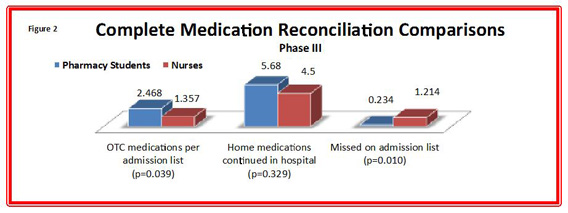
Discharge counseling: The types of changes to patients’ medication lists at discharge were different between groups when initial medication lists were generated by nurses or pharmacy students
- Pharmacy student group changes (Figure 3)
- Nursing group changes (Figure 4)
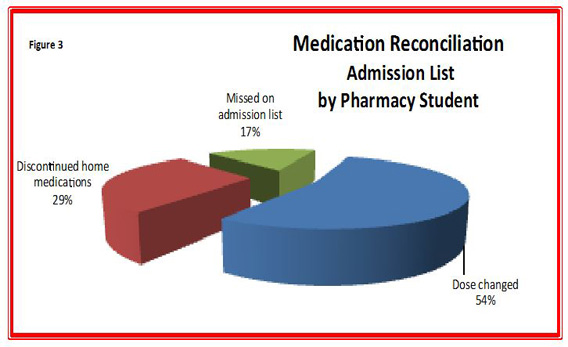
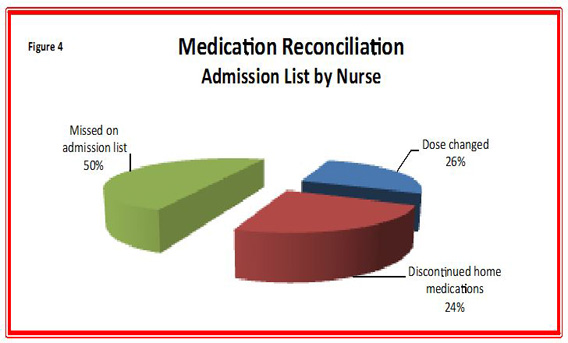
Lessons Learned
- Baseline data collection revealed that complete admission medication lists were not being obtained in the ED
- Use of a scripted procedure ensured complete and consistent evaluation of each patient’s home medications and decreased interpersonal variation
- Scripted discharge counseling ensured complete and consistent review of each discharge medication
- Pharmacy students found more current home medications per medication list and performed a more complete evaluation of each medication used by the patient at home compared to nursing staff
- OTC medications were often not included on admission lists prepared by nurses
- Pharmacy students who handed off completed admission lists to the patients’ nurse on the floor helped to increase continuity of care
- Dose changes in the discharge list represented the majority of the changes in the pharmacy student medication reconciliation
- Staff agreed that pharmacists were the most qualified to perform admission histories and discharge counseling
- Staff surveys indicated a desire for the pharmacist-driven reconciliation process to be continued as a permanent practice in the hospital
- Patients’ response to phone surveys about the pharmacist-managed discharge counseling program were very positive
Possible Considerations for Implementation at your site
- A medication reconciliation pharmacist should be scheduled at peak hours of hospital admissions and discharges
- Create scripted procedures to decrease interpersonal variation and to use as a training tool
- Relationships need to be established between the pharmacy and nursing staff to create interdisciplinary teamwork and provide optimal care to the patient
- Ensure that your medication reconciliation pharmacist is personable, proactive towards patients’ care, capable of multi-tasking, and has a strong desire to interact with patients
Conclusion
A medication reconciliation pilot program led by pharmacy students was successful in the following ways:
- It improved patient transition through the hospital and at discharge
- Fewer medications were missed on the initial medication list when completed by pharmacy students
- Transition to inpatient floors was improved by more complete medication histories obtained in the ED
- Increased continuity of care was provided for patients in the hospital
- Fewer discrepancies were noted upon discharge
- It also allowed nurses more time for direct patient care
- Interdisciplinary teamwork was increased due to the communication between pharmacy students and nursing staff
- It increased pharmacy’s role in direct patient care
- Hospital staff valued the role of pharmacy in generating home medication lists and providing medication discharge counseling to patients
- Patients in the ED appreciated the time taken by pharmacy students to obtain an accurate medication history
- Discharge counseling completed the medication reconciliation process to better prepare the patients to continue proper care at home
- Patients valued the knowledge that pharmacy students provided and the amount of time taken to conduct medication counseling at discharge
- This pilot program created a pharmacy-led role for complete medication reconciliation to provide optimal patient centered care
References
ICHPeople
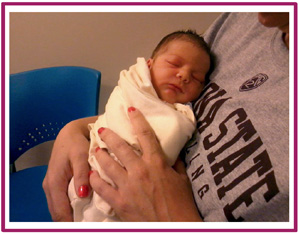 Congratulations to ICHP President, Tom Westerkamp, and his wife, Diane, who welcomed their first grandchild in July! Their grandson, Nathan Thomas Filas, was born to their daughter, Laura, and her husband, Ken, on July 11, 2013.
Congratulations to ICHP President, Tom Westerkamp, and his wife, Diane, who welcomed their first grandchild in July! Their grandson, Nathan Thomas Filas, was born to their daughter, Laura, and her husband, Ken, on July 11, 2013.
The GAS From Springfield
The New Practice Act Rules Are Here! The New Practice Act Rules Are Here!
by Jim Owen and Scott Meyers
At the July 9th Illinois Board of Pharmacy meeting, the staff of the Department of Financial and Professional Regulation released a significant rewrite of the Illinois Pharmacy Practice Act Rules. The rewrite included several clarifications of existing rules but also addressed the important issue of sterile and non-sterile compounding standards. Since the NECC debacle/disaster in Massachusetts last fall, the Department and a wide variety of pharmacy leaders have been working on updating Illinois’ sterile compounding standards.
The Department staff, after review of the task forces’ final draft, determined that tightening the sterile compounding rules wasn’t enough and decided to move to the national standards (USP-NF) for all forms of compounding. The Department has offered several exceptions to the USP-NF standards on compounding but in most cases has moved to an even tighter control of processes.
Here is that specific section of the first draft of the Rules:
Section 1330.640 Pharmaceutical Compounding Standards
The minimum standards and technical equipment considered adequate for compounding drugs shall include:
All pharmaceutical compounding standards, both sterile and non-sterile, shall be governed by the USP-NF, as set forth in the USP Compounding- Guidelines for the Compounding Practitioner (2013 ed.), except:
a) The size of the compounding area shall be of sufficient size to allow for appropriate performance of processes depending on the scope and volume of sterile compounding to be performed.
b) A pharmacy may only compound pursuant to a patient-specific prescription.
c) A drug may not be compounded for office use. However, a compounded drug may be delivered to the prescribing practitioner’s office for administration to the patient for whom the drug was compounded.
d) All pharmacies that dispense drugs must maintain, at minimum, the following standards and equipment:
a)1) A storage area separate for materials used in compounding.
b)2) Scales and balances for the compounding done in the pharmacy.
c)3) An area of the pharmacy used exclusively for compounding activities.
d)4) A heating apparatus.
e)5) A logbook or record keeping system to track each compounded prescription and the lot number and beyond-use date of components used.
f)6) A book or reference containing formulas with directions for compounding. The books and references may be in electronic format and/or available via the Internet. The USP Compounding- Guidelines for the Compounding Practitioner (2013 ed.)
g) The pharmacy operations manual shall contain the policies and procedures pertinent to the level of complexity and the size of the compounding operations of the practice at that specific pharmacy. Electronic versions are acceptable.
h)7) Consumable materials, as appropriate to the pharmacy services provided at that specific pharmacy, such as filter paper, powder papers, empty capsules, ointment jars, bottles, vials, safety closures, powder boxes, labels and distilled water.
i) The pharmacy may compound drug products to be used by practitioners in their office for administration to patients.
j) Sales of compounded drugs to other pharmacies not under common ownership, or to clinics, hospitals or manufacturers are not allowed, except for sales provided by pharmacies contracted to provide centralized prescription filling services pursuant to Section 25.5 of the Act, including compounding in anticipation of receiving a prescription or order based on routine, readily observed dispensing patterns.
e) For sterile compounding, a pharmacy must comply with the following requirements:
1) The following current resource materials and texts shall be maintained in the pharmacy:
A) American Hospital Formulary Service;
B) Copies of the Act and this Part, the Illinois Controlled Substances Act and 77 Ill. Adm. Code 3100, 21 CFR and the Illinois Hypodermic Syringes and Needles Act [720 ILCS 635];
C) One compatibility reference such as:
i) Trissel's Handbook on Injectable Drugs;
ii) King's Guide to Parenteral Admixtures; or
iii) Any other Division approved publication;
D) A file or reference on extended (more than 24 hours) stability data given to finished preparations.
2) Staffing. A pharmacist shall be accessible at all times at each licensed facility to respond to patients' and health professionals' questions and needs. A 24-hour telephone number will be included on all labeling of compounded medication and medication infusion devices if used off site.
3) Drug Distribution and Control
A) Patient Profile or Medication Record System. A pharmacy generated patient profile or medication record system shall be maintained in addition to the prescription file. The patient profile or medication record system shall contain, at a minimum:
i) Patient's full name;
ii) Date of birth or age;
iii) Gender;
iv) Compounded sterile preparations dispensed;
v) Date dispensed, if off site;
vi) Drug content and quantity;
vii) Patient directions, if preparation being administered off site;
viii) Identifying number;
ix) Identification of dispensing pharmacist and, if applicable, pharmacy technician;
x) Other drugs or supplements the patient is receiving, if provided by the patient or his or her agent;
xi) Known drug sensitivities and allergies to drugs and foods;
xii) Diagnosis; and
xiii) Lot numbers of components or individual medicine if the compounded sterile preparation is not used within 48 hours after preparation.
B) Labeling. Each compounded sterile preparation dispensed to patients shall be labeled with the following information, using a permanent label:
i) Name, address and telephone number of the licensed pharmacy, if not used within facility;
ii) Administration date and identifying number if used on site, date dispensed, and identifying number if used off site;
iii) Patient's full name and room number, if applicable;
iv) Name of each drug, strength and amount;
v) Directions for use and/or infusion rate if used off site;
vi) Prescriber's full name if used off site;
vii) Required controlled substances transfer warnings, when applicable;
viii) Beyond use date and time;
ix) Identity of pharmacist compounding and dispensing, or other authorized individual; and
x) Auxiliary labels storage requirements, if applicable.
C) The pharmacist-in-charge shall ensure that records are maintained for 5 years and are readily retrievable and in a format that provides enforcement agents an accurate and comprehensive method of monitoring distribution via an audit trail. The records shall include at least the following information:
i) Patient profile;
ii) Medication record system;
iii) Purchase records; and
iv) Lot numbers of the components used in compounding sterile prescriptions/orders traceable to a specific patient, if not included on patient profile and if the preparation is not utilized within 48 hours after preparation.
4) Delivery Service. The pharmacist-in-charge shall assure the environmental control of all preparations shipped or delivered off site. Therefore, any compounded, sterile pharmaceutical must be shipped or delivered to a patient in temperature controlled (as defined by USP Standards) delivery containers.
5) Emergency Medications. Pharmacies that dispense compounded sterile preparations to patients in facilities off site or for administration in the patient's residence shall stock supplies and medications appropriate for treatment of allergic or other common adverse effects, to be dispensed upon the prescription or order of an authorized prescriber.
These new rules now basically require compliance to USP Chapter 797 for all institutions or compounding pharmacies that prepare sterile compounds. For many, this change is what has been requested and even pleaded for. For many others, this change has been dreaded since 797 jumped into the national spotlight in 2007.
Within this section of the new rules are some curious requirements that can hopefully be clarified quickly.
b) A pharmacy may only compound pursuant to a patient-specific prescription. Does this mean that a pharmacy may no longer compound in anticipation of patient specific prescriptions or orders? That’s a problem.
d) All pharmacies that dispense drugs must maintain, at minimum, the following standards and equipment: Should “dispense” really be changed to “compound”?
d) 5) A logbook or record keeping system to track each compounded prescription and the lot number and beyond-use date of components used.
Is this logbook to be used for non-sterile compounds only? Sterile Compounds are treated separately elsewhere.
d) 6) The USP Compounding Guidelines for the Compounding Practitioner is now required of all compounding pharmacies. Is a subscription to the entire USP-NF okay in its place since the latter contains all the former’s chapters and much more?
e) 2) For sterile compounding: Staffing. A pharmacist shall be accessible at all times at each licensed facility to respond to patients’ and health professionals’ questions and needs. A 24-hour telephone number will be included on the labeling of compounded medication and medication infusion devices if used off site. Does this mean all hospital pharmacies will need to be staffed on site 24/7?
These questions are all hopefully easily clarified, but as you can imagine, they could have significant consequences if clarified the wrong way. There are a variety of other changes to the practice act rules, and we encourage every member to go to the ICHP website and read them if you haven’t already. In mid-July ICHP sent an announcement of the release of these new rules and a link to that site, so hopefully this is not completely new information. While the initial Department comment period has passed and a formal comment period is next up, it is important for every pharmacist and pharmacy technician to review the entire document and provide feedback where they feel it is needed.
On a follow-up note from last month’s GAS, we want to report, just in case you haven’t been paying attention, that the Governor’s July 9th deadline for the General Assembly to resolve Illinois’ looming pension crisis came and went without a whimper! Although the Legislators were whimpering shortly after the deadline as the Governor suspended both his and the General Assembly’s pay until the issue is resolved. Whether action will be taken before this article is published is unknown or whether the courts will step in to arbitrate is equally uncertain. But what is certain is, if you want something done in Illinois, you probably shouldn’t leave it to our elected officials!
Keep your eyes open for more updates as the Illinois Pharmacy Practice Act Rules morph and move closer to publication. ICHP will do its best to keep you informed!
New Practitioners Network
Unmatched and Scrambled – The Story of How I Rebuilt My Residency Candidacy
by Robin Carney, PharmD, PGY-1 Resident, Franciscan Health Systems, Tacoma, WA
There I was, Match Day 2012, with my choice programs ranked and my hopes high. This was the moment I had waited for and worked toward for the last four years of pharmacy school. Around 6:30 am CST, the email arrived to my inbox. “Dear Prospective Residency Candidate…” I was almost too nervous to read it. “We regretfully inform you that you did not successfully match”. My heart sunk and my first instinct was to crawl under a rock and not come out for several years. Instead, I called my mother who gave me a pep talk. With determination, I quickly picked myself back up and launched full force into the battle known as the post-match scramble. I was not going to give up on doing a residency. The odds were tough though; for the 1,438 candidates who remained unmatched, there were only 106 open residency positions left. I emailed my application to as many places as I possibly could across the continental U.S. Out of the twenty or so programs I sent applications to, most politely rejected, some never responded, and I interviewed at one program. This program offered me the position but unfortunately, it was not the right fit for my professional plans. So for 2012, my residency dreams were extinguished. Of course I wasn’t going to give up on doing a residency. It was my dream to become a clinical pharmacist in a health-system and I was determined to make that dream into a reality. It would be like running a marathon just to stop at mile 25. But I had to seriously ask myself the question, “What do I do now?”
The first logical step was to gather advice from pharmacy mentors. These are professionals I admire not only for being exemplary for our profession but also for their willingness to advise the upcoming generations of pharmacists. Mike Fotis, Miriam Mobley-Smith, Desi Kotis, Nora Flint, John Esterly, Antoine Jenkins, and Diana Isaacs all offered encouraging words. I am deeply grateful to them for their inspirational advice because it set me on the right path again.
The next step was self-reflection. What were the reasons I wasn’t selected? Was it because I wasn’t a strong enough candidate? Was it a lack of confidence in my potential? These were all important thoughts I needed to reflect on and answer. I also asked for feedback from residency programs that I had interviewed with and other professionals that I knew. It was this re-assessment and evaluation of my skills that was a key piece in my strategy.
After reflection came action. I sought out to gain diverse professional experiences throughout the year. I accepted a staff position working for a retail pharmacy chain where I precepted pharmacy students and volunteered my time counseling patients at community health fairs. I also helped teach a course in pharmacy practice at a pharmacy school and joined ICHP’s New Practitioners Network. These are just a few examples of opportunities I looked for and took advantage of to make myself a better candidate.
Finally, the last step was to apply again. Yet this time I broadened my search to programs across the country. From Seattle to Boston, I interviewed with programs. I was much less nervous and much more determined during this session of interviews compared to the previous year.
When Match Day arrived in 2013, I was once again nervous but more confident and hopeful. The email arrived: “Congratulations! You have been matched!” Not only did I match this time but it was my top choice. I was elated; it was probably one of the best moments of my life so far. Then I called my mother, but this time to deliver good news. As I write this now I am just entering into the first month of my PGY-1 residency, and I must say it feels amazing to be here.
College Connections
Welcoming Midwestern University’s ICHP E-Board!
President, Janey Yu – This past year, I served as the President-Elect and am excited to be the incoming President for the ICHP student chapter at Midwestern University! This fall, I plan on organizing an internship information session in health-system pharmacy for PS-1s and PS-2s. In addition, I plan to implement an "ICHP Member of the Year" award program while raising awareness that ICHP is THE organization to join for residency information, volunteer opportunities, and networking events.
 President-Elect, Carolyn Toy – As incoming President-Elect, I would like to increase student awareness and membership by better promoting and communicating information about ICHP before the start of the school year. I would also like to increase member opportunities and participation with the development of committees and would like to encourage attendance to professional meetings like Midyear by providing reimbursement on travel as an incentive. I would love to see ICHP grow and will try to ensure that it will continue to provide student members the medium to grow personally and professionally while here at Midwestern.
President-Elect, Carolyn Toy – As incoming President-Elect, I would like to increase student awareness and membership by better promoting and communicating information about ICHP before the start of the school year. I would also like to increase member opportunities and participation with the development of committees and would like to encourage attendance to professional meetings like Midyear by providing reimbursement on travel as an incentive. I would love to see ICHP grow and will try to ensure that it will continue to provide student members the medium to grow personally and professionally while here at Midwestern.
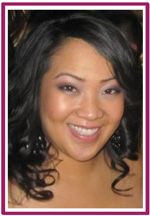
Secretary, Diana Mata – My goal for the upcoming year is to help ICHP grow on campus as we cater to our members’ needs as they embark on a journey toward residency. I want to make sure that our members are aware of the activities that we are involved in on campus. As members participate in the Clinical Skills competition, shadowing opportunities, and the annual Legislative Day, I will keep an accurate record of members' participation and contributions so that we can award recognition to our outstanding member at the end of the year.
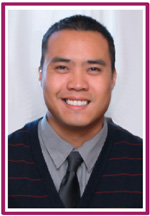 Treasurer, Patrick Binaday – I enjoyed being a member of ICHP during my first year of pharmacy school and I am excited to serve as this year's treasurer! One of my goals this year is to increase membership involvement in organizational events, especially in the upcoming Legislative Day. Our ICHP chapter has a great opportunity to not only make an impact in our school, but also in our community and I am delighted to be a part of it.
Treasurer, Patrick Binaday – I enjoyed being a member of ICHP during my first year of pharmacy school and I am excited to serve as this year's treasurer! One of my goals this year is to increase membership involvement in organizational events, especially in the upcoming Legislative Day. Our ICHP chapter has a great opportunity to not only make an impact in our school, but also in our community and I am delighted to be a part of it.
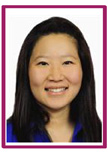 Historian, Carrie Park – I plan to maintain our chapter’s history by contributing to KeePosted newsletters and by utilizing social media through photographs and videos. I hope to continue spreading ICHP’s presence on campus and in our community by documenting various professional gatherings, volunteer projects, and social events. My goal in doing so is to promote both student involvement and awareness of this organization.
Historian, Carrie Park – I plan to maintain our chapter’s history by contributing to KeePosted newsletters and by utilizing social media through photographs and videos. I hope to continue spreading ICHP’s presence on campus and in our community by documenting various professional gatherings, volunteer projects, and social events. My goal in doing so is to promote both student involvement and awareness of this organization.
 Professional Chair, Nabiha Mahmood – As the Professional Chair, I hope to work towards creating interest and excitement towards pharmacy residencies. Additionally, I hope to provide opportunities for students to become better prepared for life after graduation, including clinical skills development, CV/resume building and interviewing skills. I look forward to another successful year!
Professional Chair, Nabiha Mahmood – As the Professional Chair, I hope to work towards creating interest and excitement towards pharmacy residencies. Additionally, I hope to provide opportunities for students to become better prepared for life after graduation, including clinical skills development, CV/resume building and interviewing skills. I look forward to another successful year!
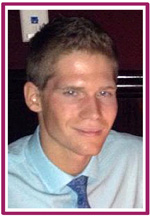 Philanthropy Chair, Zachary Stewart – As Philanthropy Chair, my main goal is to improve our current volunteer events while creating new opportunities for our members. I am very excited about the success of our Brown Bag Event at Mayslake, and I hope to improve this event during this coming year. I would also like to collaborate with other ICHP chapters in the Chicago area to create more healthcare-related volunteer opportunities.
Philanthropy Chair, Zachary Stewart – As Philanthropy Chair, my main goal is to improve our current volunteer events while creating new opportunities for our members. I am very excited about the success of our Brown Bag Event at Mayslake, and I hope to improve this event during this coming year. I would also like to collaborate with other ICHP chapters in the Chicago area to create more healthcare-related volunteer opportunities.
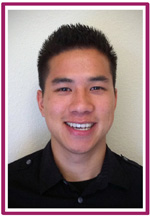 Social Chair, Steven Trinh – As a returning board member, my goals are to elevate ICHP's presence and to improve membership quality through social events. In order to achieve that, I will do my best to plan exciting events throughout the year that involve more interactions among members. I plan on making this year a memorable one for all ICHP members.
Social Chair, Steven Trinh – As a returning board member, my goals are to elevate ICHP's presence and to improve membership quality through social events. In order to achieve that, I will do my best to plan exciting events throughout the year that involve more interactions among members. I plan on making this year a memorable one for all ICHP members.
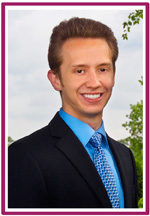 Fundraising Chair, Mitch Steinbrenner – I want to introduce new fundraisers as well as improve current fundraisers. I would like for some of the newer events to be more social. It is my goal to have more than one fundraiser per quarter in order to increase our organization’s profits. I want ICHP’s fundraising events to be both memorable and successful.
Fundraising Chair, Mitch Steinbrenner – I want to introduce new fundraisers as well as improve current fundraisers. I would like for some of the newer events to be more social. It is my goal to have more than one fundraiser per quarter in order to increase our organization’s profits. I want ICHP’s fundraising events to be both memorable and successful.
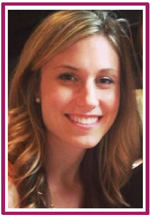 Membership Chair, Ashley Brown – I am looking forward to serving as the Membership Chair for the second year and continue the growth of our ICHP chapter. I plan on expanding our chapter and providing opportunities for students to progress while in school and as postgraduates. As Membership Chair I will share my enthusiasm for the organization as well as the endless benefits offered by ICHP.
Membership Chair, Ashley Brown – I am looking forward to serving as the Membership Chair for the second year and continue the growth of our ICHP chapter. I plan on expanding our chapter and providing opportunities for students to progress while in school and as postgraduates. As Membership Chair I will share my enthusiasm for the organization as well as the endless benefits offered by ICHP.
Student Leadership Development at ASHP 2013 Summer Meeting
by Alex Mersch, P-2, SSHP President, Roosevelt University College of Pharmacy, and Stephen Jankovic, P-2, SSHP Vice President, Roosevelt University College of Pharmacy
The Roosevelt University College of Pharmacy Student Society of Health-System Pharmacy believes constant training in leadership and professional skills is of paramount importance to maintaining an active and quality chapter. With this mindset, our executive board jumped at the opportunity to learn as well as better ourselves and our chapter at the 2013 ASHP Summer Meeting in Minneapolis, Minnesota. As chapter president and vice president, we attended the conference and sought to learn pertinent and innovative ideas at the Student Leadership Development Workshop. This being our first national conference, we arrived open-minded and prepared for a diverse range of positive and worthwhile experiences. During our time in Minneapolis, we learned and experienced valuable lessons in networking, conference navigation, pharmacology, and new practice evidence. We also learned a bit about ourselves along the way.
The conference began on Saturday night at the President's Reception. This was a great opportunity for conference attendees to network with familiar faces as well as new ones. The various interactions were evidence that participating at the local, state, and national level in ASHP encourages professional connections that can last a lifetime. We learned all too quickly how these conversations could be started with a friendly hello and continued for some time talking over the shared passion of pharmacy. A student dinner was planned after the President’s Reception and allowed us to connect with different pharmacy students from across the country. Topics of conversation ranged from classes and rotations to current topics in healthcare such as the implications of The Affordable Care Act.
The next day began with, "Meet and Greet with Pharmacy Leaders.” Students met with past and present pharmacy leaders from diverse backgrounds including PBM Presidents, Pharmacy Directors, and Association Leaders. Wisdom, life-stories, career development ideas and many more valuable insights were shared. We had the privilege of meeting several knowledgeable, prestigious, and experienced leaders. These leaders shared how they changed the world of pharmacy and gave insight on how to rise to the various challenges that today’s healthcare has presented. Meeting them was an incredible and unique experience that would not have been available to us anywhere else outside of the conference.
Immediately after the Meet and Greet session, the Student Leadership Development Workshop began. Both of us had been to a variety of workshops in the past dealing with non-pharmacy leadership. This workshop was extensive, comprehensive and relevant, and superseded any past events we had attended. Topics including leadership theory, self-exploratory exercises, an analysis of the evolving needs and opportunities in pharmacy leadership, mentoring and residency information were covered. The presentation provided compelling motivation and excitement for leadership developments in pharmacy. Dr. Megan Swarthout led the presentation with an engaging attitude, keeping students interested and learning.
The rest of our time at the conference was dedicated to educational breakout sessions on pharmaceutical, professional, and health-system pharmacy practice knowledge. The sessions provided pertinent, intriguing, and new practice initiatives. We also had the opportunity to see the presentation of awards to outstanding, passionate and caring pharmacists. These pharmacists overcame great adversity and challenges to provide the best possible care to their patients. We were invigorated by their contributions and dedication to health-system pharmacy.
Our last event was attending the keynote speaker event. Mr. Peter Diamandis gave us a revolutionary vision of how healthcare is changing. He encouraged the audience to view the upcoming world of healthcare in an exponentially evolving fashion versus a linear view. The wide range of innovative ideas and services which are now becoming reality in healthcare is astounding. The presentation showed the importance of being lifelong learners and improving our knowledge through avenues such as residency and board certification.
We departed from the conference bursting with ideas to improve ourselves, our chapter, and our community. Attending the ASHP conference was a unique and rewarding adventure that we will carry with us throughout our lives and professional careers. We plan on attending and promoting involvement in ICHP’s Annual Meeting this September and ASHP’s Midyear Clinical Meeting in December. We have learned and observed how leadership development is an ongoing process and look forward to embracing that journey through our SSHP, ICHP, and ASHP affiliations.
Practice Makes Perfect
by RaeAnn Hirschy, PS-3, SSHP Treasurer, Rosalind Franklin University of Medicine and Science, College of Pharmacy
The world of pharmacy is ever changing. I, like most of the public, had little idea growing up what was included in the profession of pharmacy. Prior to pharmacy school, I only knew of retail practice and had to do research to learn about other employment opportunities that exist for pharmacists. When starting pharmacy school at Rosalind Franklin University of Medicine and Science (RFUMS), which has a novel interprofessional approach to education, I began to see how pharmacists serve as a vital member of an interdisciplinary team. As part of my Introductory Pharmacy Practice Experience (IPPE), I quickly learned that clinical pharmacy is the career path for me. In order to reach this goal, I began to research how to gain experience and what steps are required. I feel that vital parts of my path should include gaining as much experience as I can, understanding how a hospital works, and having the opportunity to use real life application for what I am learning in pharmacy school. Gaining experience as early as I can, will enable me to be certain that hospital is the right fit for me.
These goals led me to search for a hospital-based summer internship to learn how to achieve my career goals. NorthShore University Health System consists of four hospitals, which collaborate with RFUMS in a teaching certificate program for the pharmacy practice residents and pharmacist preceptors. Part of the requirements of this program is for the residents and pharmacists to visit RFUMS to lecture, lead discussions, answer questions and help in pharmacy skills lab. All who came to the college from NorthShore appeared to enjoy these activities and were eager to help and seemed to value education. Therefore, I was thrilled to discover NorthShore University Health System has a summer internship program. The requirements of the internship are: a minimum GPA of 3.0, completion of the P-2 year, and an Illinois pharmacy technician license. A curriculum vitae, transcript, statement of interest and three references must also be submitted via mail and a phone interview is conducted. There are four inpatient and two outpatient positions.
I am currently enjoying an inpatient internship at Glenbrook Hospital. This internship includes many enlightening experiences such as leading topic discussions and patient case discussions with my preceptor, preparing medications in the IV room, obtaining patient medication histories, teaching a class to patients who have upcoming surgeries, counseling patients, shadowing pharmacists, presenting a journal club to the pharmacy staff, and completing several quality improvement projects for the pharmacy department. I have never considered myself one for public speaking but many of these activities have helped me to be more comfortable speaking in front of a group. I am looking forward to the remaining weeks.
In addition to the hospital pharmacy exposure I am gaining, the internship has helped answer many questions I had regarding pharmacy practice residencies. I have attended many presentations given by the residents, shadowed the pharmacy residents on rotation and received answers to many of my residency questions.
Experience is extremely important to professional growth. This summer internship is a great opportunity and Glenbrook Hospital is a wonderful place to prepare to achieve my future goals. While we all may strive for perfection, I believe that with experience I can learn and practice skills which will help me be a better pharmacist and will help me make more informed decisions throughout my pharmacy career.
What…Canines are on Campus!?
by Ann Ryan, PS-2, ICHP Mental Wellness Chair, University of Illinois College of Pharmacy at Rockford
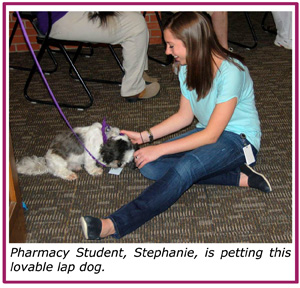 Recently, the Illinois Council of Health-System Pharmacists (ICHP) student division at the College of Pharmacy in Rockford had a unique experience with local therapy dogs. This idea was suggested by a close friend of the ICHP Mental Wellness Committee and fellow student, Juhae Lee. On May 1, 2013 the committee invited Caring Canines to come visit with students and faculty. Final exams were scheduled for the following week, so the committee felt that it would be rather appropriate to bring a calming presence to the school community. These friendly visitors were just what we needed. There were six dogs of various breeds, ranging from a very small Papillon to a couple of large Labrador Retrievers.
Recently, the Illinois Council of Health-System Pharmacists (ICHP) student division at the College of Pharmacy in Rockford had a unique experience with local therapy dogs. This idea was suggested by a close friend of the ICHP Mental Wellness Committee and fellow student, Juhae Lee. On May 1, 2013 the committee invited Caring Canines to come visit with students and faculty. Final exams were scheduled for the following week, so the committee felt that it would be rather appropriate to bring a calming presence to the school community. These friendly visitors were just what we needed. There were six dogs of various breeds, ranging from a very small Papillon to a couple of large Labrador Retrievers.
You may be wondering about the purpose behind bringing therapy dogs to the workplace or school environment. These dogs are part of a program developed by Deb, from Swedish American Hospital; she also works with other healing programs at the hospital such as Expressive Arts Therapy and Holistic Healing. Deb built the Caring Canines program from the ground up and ensures that each dog has completed strict training qualifications. A few of the requirements for these furry volunteers include the following – they must register with a national therapy dog organization, complete a temperament assessment, be predictable, love people and other dogs, and master many other desirable qualities.
Each dog has their own ID badge, just like every other volunteer at Swedish American. They even have their own “business cards” – complete with a brief biography. Typically, the dogs will visit patients in the hospital to help ease their suffering and pain. I am sure that many of the students and faculty at the college would agree that their day was significantly brightened because of these good will ambassadors. It is estimated that the dogs were petted and cuddled by 75 visitors!
As pharmacy students, we study the beneficial effects of medications and their healing powers. We spend hours learning the mechanism of action, important interactions, side effects, metabolism/excretion profiles, primary indications, etc. of various prescriptions and non-prescription therapies. It is all too easy for us to become wrapped up into our pharmaceutical profession…and sometimes this is very necessary. However, it is important for us as students to remember the significance of healing from other sources.
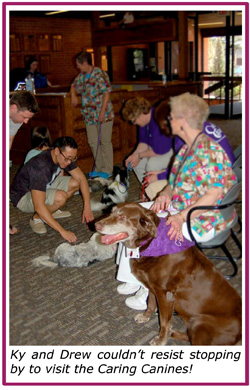 It is all about the patient. Our professors repeatedly teach us that we must be creative and find ways to encourage healing and recovery in any way that will work safely. Our expertise is with “drugs” but our purpose is to ease suffering and promote healing. This experience has proven that it can be fun to step outside of our profession to see what else is out there. What place do therapy dogs have in pharmacy? I like to believe that animal therapy can enhance medication therapy. It is clear that we are entering a healthcare arena that requires interdisciplinary efforts to provide optimal patient care…or in this case interspecies.
It is all about the patient. Our professors repeatedly teach us that we must be creative and find ways to encourage healing and recovery in any way that will work safely. Our expertise is with “drugs” but our purpose is to ease suffering and promote healing. This experience has proven that it can be fun to step outside of our profession to see what else is out there. What place do therapy dogs have in pharmacy? I like to believe that animal therapy can enhance medication therapy. It is clear that we are entering a healthcare arena that requires interdisciplinary efforts to provide optimal patient care…or in this case interspecies.
We would like to thank the owners of these exceptional furry friends for taking the time out of their day to meet with some stressed out pharmacy students. In addition, we would like to thank Deb for accepting our invitation, and recognize her for all of the hard work it takes to develop and maintain Caring Canines. Most importantly, we want to thank the dogs – Ben, Cassie, Cricket, Jackson, Theodore, and Ransom – for helping to alleviate tension around campus. We hope you enjoy the frisbees and tennis balls from ICHP!
More
Officers and Board of Directors
TOM WESTERKAMP President224-948-1528 tom_westerkamp@baxter.com
CHRIS RIVERS Immediate Past President Chairman, Nominations Committee 708-202-7240 criversrx@gmail.com
MIKE FOTIS President-Elect michael.fotis@northwestern.edu MIKE WEAVER Treasurer 815-599-6113 mweaver@fhn.org KATHY KOMPERDA Secretary 630-515-6168 kkompe@midwestern.eduTRAVIS HUNERDOSSE Director, Educational Affairs Travis_Hunerdosse@rush.edu
EDWARD RICKERT Director, Government Affairs 618-402-7416 erickert@kdlegal.com JENNIFER ELLISON Director, Marketing AffairsJennifer.C.Ellison@osfhealthcare.org
JENNIFER PHILLIPS Director, Professional Affairs Assistant Editor, KeePosted 630-515-7167 jphillips@midwestern.edu LINDA FRED Director, Organizational Affairs 217-383-3253 linda.fred@carle.com
ANN JANKIEWICZ Chairman, House of Delegates 312-942-5706 ann_m_jankiewicz@rush.edu
ELIZABETH ENGEBRETSON Technician Representative 815-756-1521x153346 EEngebretson@northshore.org
DAVID TJHIO Chairman, Committee on Technology 816-885-4649 david.tjhio@cerner.com
JENNIFER ARNOLDI Chairman, New Practitioners Network JeArnol@gmail.com JACOB GETTIG Editor & Chairman, KeePosted Committee 630-515-7324 fax: 630-515-6958 jgetti@midwestern.edu DESI KOTIS Regional Director North 312-926-6961 dkotis@nmh.orgMARK LUER Regional Director South mluer@siue.eduSCOTT BERGMAN Regional Director Central scbergm@siue.edu EMMA CARROLL President, Student ChapterUniversity of IL C.O.P. emmacarroll620@gmail.com NADIYAH CHAUDHARY President, Rockford Student Chapter University of IL C.O.P. nadi925@gmail.comJANEY YU President, Student ChapterMidwestern University C.O.P. janey.yu@mwumail.midwestern.edu
BERNICE MAN President, Student Chapter Chicago State University C.O.P. bman@csu.edu TRAMAINE HARDIMON Student Representative Chicago State University C.O.P thardimon@csu.edu ZAK VINSON President, Student Chapter Southern Illinois University S.O.Pzvinson@siue.edu
ALEX MERSCH President, Student Chapter Roosevelt University C.O.P. amersch@mail.roosevelt.edu
JENNIFER AGUADO President, Student Chapter Rosalind Franklin University C.O.P. jennifer.aguado@my.rfums.org SCOTT MEYERS Executive Vice President, ICHP Office 815-227-9292 scottm@ichpnet.org
ICHP AFFILIATES
JENNIFER PHILLIPS President, Northern IL Society (NISHP) 630-515-7167 jphillips@midwestern.edu JULIA SCHIMMELPFENNIG President, Metro East Society (MESHP) jschimmelpfen@sebh.org MEGAN METZKE President, Sangamiss Society memiller8@yahoo.com
ED RAINVILLE President, West Central Society (WSHP) 309-655-7331x ed.c.rainville@osfhealthcare.org
Vacant Roles at Affiliates —
President, Rock Valley Society; Southern IL Society; Sugar Creek Society
Welcome New Members!
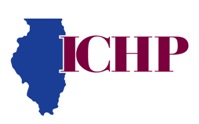
| New Members |
Recruiter |
| Katerina Anastasiou |
|
| Nicole Rabs |
|
| Alby Jacob |
|
| Brenton Bastian |
|
| Kelly Percival |
|
| Kymberlee Berardi |
James Shafer |
| Nainita Patel |
Erick Borkowski |
| Chad Richardson |
|
| Thomas Wang |
|
| Robert Brower |
|
| Aalap Modi |
|
| Janeen Winnike |
|
| Robert Mokszycki |
|
| Tyler Bickel |
|
| Nicholas Hewitt |
Tim Dunphy |
| Mallory Rueter |
|
| Michael Bruno |
|
| Susan Hohenberger |
Thomas Warzecha |
| Kyle Mays |
Margaret Heger |
| Natalie Thompson |
|
| Dalia Kern |
|
ICHP Pharmacy Action Fund (PAC) Contributors
GENERAL ASSEMBLY GUILD - $1000 & More Scott BergmanDan CiarrachiKevin ColganEdward DonnellyAndrew DonnellyDave HicksICHP James Owen Consulting Inc. Frank KokaislScott MeyersMichael NovarioMichael RajskiEdward RickertMichael ShortCarrie SincakAvery SpuntMichael WeaverPatricia WegnerThomas Westerkamp SPRINGFIELD SOCIETY - $500-$999 Jered BauerStephanie CrawfordGinger ErtelLinda FredAnn JankiewiczJan KeresztesKathy KomperdaLeonard KosibaDespina KotisHuzefa MasterWilliam McEvoyChristina RiversMiriam Mobley-SmithJoAnn Stubbings CAPITOL CLUB - $250-$499 Sheila AllenMargaret AllenPeggy BickhamJaime BorkowskiTimothy CandyRauf Dalal Drury Lane Theater Sandra DurleyStarlin Haydon-GreattingVern JohnsonGeorge MacKinnonJanette MarkHeather MingerJennifer PhillipsEdward RainvilleKathryn SchultzHeidi SundayJill WarszalekAlan Weinstein LINCOLN LEAGUE - $100-$249 Tom AllenAnonymous Jen ArnoldiJerry BaumanJill BorchertSe ChoiScott DrabantNancy FjortoftNora FlintMichael FotisJacob GettigGireesh GupchupJoann HaleyJoan HardmanTravis HunerdosseJames JansenZahra KhudeiraMary LeeJohn LeGrandKristopher LejaPhyllis LulinskiGeorge LyonsGloria MeredithMWU COP Student Chapter Peggy ReedKatie RonaldDon ShadensackKristi Stice GRASSROOTS GANG - $50-$99 Sean ChantraparoutJordan CohenMark DeatonRhonda DePasqualeGlenna HargreavesLois HonanCharlene HopeDiana IsaacsGerald JablonskiKim JanicekDwaine KellerColleen KielchKati KwasiborskiKim LimScott MetzgerShannon PaceBarbara SmithLucas StollerCarrie VoglerMarie Williams CONTRIBUTOR - $1-$49 Daniel AbaziaBrett Barker
Elvira Becker
Amanda Bryant
Colleen Czerniak
Gabrielle Daniels
Agnes Dominic
Judy Douglas
Jeanne Durley
Kathy Eakright
Lara Ellinger
Jennifer Ellison
Brooke Griffin
Susan Hamilton
Richard Januszyk
George Jossel
Alex Lomahan
Bella Maningat
Sarah Matias
Lindsay McNeely
Virginia Nash
Karen Nordstrom
Gopi Patel
Jeremy Raschke
Jolee Rosenkranz
Jeri Rothman
Mark Ruscin
Ann Ryan
Allison Schriever
Wade Seggerman
Jennifer Splawski
Brandi Strader
Ellen Voelker
Shari Weyland
Laura Woskobnick
Izabela Wozniak
Upcoming Events
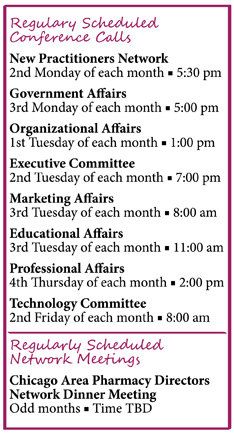
Friday, August 9
Ballots DUE! NISHP Elections
Friday, August 23
Deadline: 2014 ICHP Spring Meeting Call for Presentations
Friday, August 23
CPE Event! Southern Illinois University Edwardsville School of Pharmacy 7th Annual Golf Scramble
Stonebridge Golf Club | Maryville, IL
Thursday, September 5 and Monday, September 9
CPE Event! Champion Webinar: Journal Club Review
LIVE Webinar
Thursday, September 19 – Saturday, September 21
Registration Now Open! ICHP Annual Meeting
Drury Lane Theatre and Conference Center | Oakbrook Terrace, IL
www.ichpnet.org/annualFriday, September 20Reservations Available! ICHP 50th Anniversary GalaDrury Lane Theatre and Conference Center | Oakbrook Terrace, IL
www.ichpnet.org/50Tuesday, October 1Call for Posters! 2014 ICHP Spring MeetingDeadline for Submission: Wednesday, January 15, 2014
Wednesday, October 2
CPE Event! NISHP CPE Live Program: New Drugs, New Problems: Reversal Options for New Anticoagulants
Rush University Medical Center | Chicago, IL
Tuesday, October 15
Submission Deadline: 2013 ICHP Student Chapter Video Contest
Monday, November 4 and Wednesday, November 13
CPE Event! Champion Webinar: Mr. ROSS
LIVE Webinar
Wednesday, November 6
CPE Event! NISHP Live CPE Program: Sedation
Midwestern University | Downers Grove, IL
Thursday, December 5
NISHP Live Program: TBA
Location TBA

Print Entire Issue


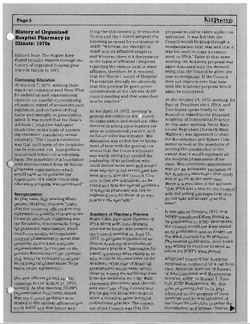
 Hi, my name is Cassidy McDonald, and I am currently a fourth year pharmacy student at University of Illinois College of Pharmacy at the Rockford campus. I am from Ottawa, Illinois, which is an hour south from Rockford. I completed my pre-pharmacy coursework at Illinois Valley Community College. I then moved on to complete my Bachelor’s degree in Biological Sciences at Northern Illinois University. Throughout my undergraduate studies, I worked as a Pharmacy Technician at CVS Pharmacy. Once I was accepted to pharmacy school, I was offered a student position at OSF St. Elizabeth Medical Center in Ottawa.
Hi, my name is Cassidy McDonald, and I am currently a fourth year pharmacy student at University of Illinois College of Pharmacy at the Rockford campus. I am from Ottawa, Illinois, which is an hour south from Rockford. I completed my pre-pharmacy coursework at Illinois Valley Community College. I then moved on to complete my Bachelor’s degree in Biological Sciences at Northern Illinois University. Throughout my undergraduate studies, I worked as a Pharmacy Technician at CVS Pharmacy. Once I was accepted to pharmacy school, I was offered a student position at OSF St. Elizabeth Medical Center in Ottawa. When I am not studying for exams or preparing for a presentation, I love to spend time with my family and friends. My hobbies include hiking, walking, shopping, traveling, baking, and volunteer activities. I have two dachshunds, Lizzy and Duke, and I love spending time and traveling with them.
When I am not studying for exams or preparing for a presentation, I love to spend time with my family and friends. My hobbies include hiking, walking, shopping, traveling, baking, and volunteer activities. I have two dachshunds, Lizzy and Duke, and I love spending time and traveling with them. Hi, my name is Jamie Tidaback and I’m a P-4 student at the University of Illinois at Chicago (Rockford campus). I was born in Mississippi and lived there for 10 years before moving to Spring Valley, Illinois. I graduated from Hall High School in 2005 and continued my education at Illinois Valley Community College (IVCC), where I completed my pharmacy pre-requisites. After IVCC, I commuted to Northern Illinois University to receive my Bachelor’s degree in Biological Sciences. I graduated from NIU in 2010. Since 2006, I’ve been a pharmacy technician for CVS/Pharmacy in Peru, Illinois. In my free time, I volunteer for my local March of Dimes chapter, have coached girls’ softball, and spend time with my two wonderful black Labradors. I enjoy watching movies and sports (go Cubs go!), as well as participating in sporting events.
Hi, my name is Jamie Tidaback and I’m a P-4 student at the University of Illinois at Chicago (Rockford campus). I was born in Mississippi and lived there for 10 years before moving to Spring Valley, Illinois. I graduated from Hall High School in 2005 and continued my education at Illinois Valley Community College (IVCC), where I completed my pharmacy pre-requisites. After IVCC, I commuted to Northern Illinois University to receive my Bachelor’s degree in Biological Sciences. I graduated from NIU in 2010. Since 2006, I’ve been a pharmacy technician for CVS/Pharmacy in Peru, Illinois. In my free time, I volunteer for my local March of Dimes chapter, have coached girls’ softball, and spend time with my two wonderful black Labradors. I enjoy watching movies and sports (go Cubs go!), as well as participating in sporting events.
 So, why are you reading this in ICHP’s KeePosted newsjournal? Well, for my first rotation I selected to complete six weeks at the ICHP headquarters in Loves Park, Illinois. My preceptor is Scott Meyers and I’m also working with another student from the UIC-Rockford campus, Cassidy McDonald. I chose this rotation because I wanted something that was out of my comfort zone. Honestly, I’m not very familiar with a lot of legislative material, so I wanted to see what I could pick up on and become more comfortable with this topic in pharmacy. So far, the staff is very friendly and welcoming and always willing to explain how something is done. I look forward to attending Board meetings, planning for ICHP’s 50th Anniversary, and any other behind-the-scenes action that ICHP has to offer. I feel that I will take away a lot from this ICHP rotation at the end of six weeks.
So, why are you reading this in ICHP’s KeePosted newsjournal? Well, for my first rotation I selected to complete six weeks at the ICHP headquarters in Loves Park, Illinois. My preceptor is Scott Meyers and I’m also working with another student from the UIC-Rockford campus, Cassidy McDonald. I chose this rotation because I wanted something that was out of my comfort zone. Honestly, I’m not very familiar with a lot of legislative material, so I wanted to see what I could pick up on and become more comfortable with this topic in pharmacy. So far, the staff is very friendly and welcoming and always willing to explain how something is done. I look forward to attending Board meetings, planning for ICHP’s 50th Anniversary, and any other behind-the-scenes action that ICHP has to offer. I feel that I will take away a lot from this ICHP rotation at the end of six weeks. President's Message
President's Message Directly Speaking
Directly Speaking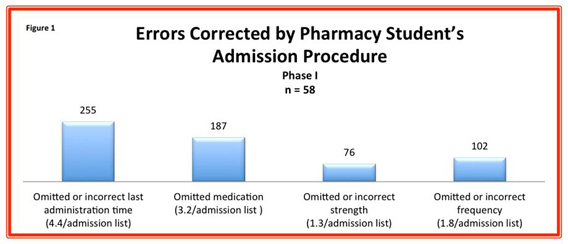



 Congratulations to ICHP President, Tom Westerkamp, and his wife, Diane, who welcomed their first grandchild in July! Their grandson, Nathan Thomas Filas, was born to their daughter, Laura, and her husband, Ken, on July 11, 2013.
Congratulations to ICHP President, Tom Westerkamp, and his wife, Diane, who welcomed their first grandchild in July! Their grandson, Nathan Thomas Filas, was born to their daughter, Laura, and her husband, Ken, on July 11, 2013.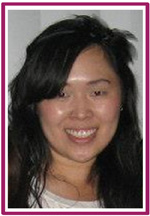
 President-Elect, Carolyn Toy – As incoming President-Elect, I would like to increase student awareness and membership by better promoting and communicating information about ICHP before the start of the school year. I would also like to increase member opportunities and participation with the development of committees and would like to encourage attendance to professional meetings like Midyear by providing reimbursement on travel as an incentive. I would love to see ICHP grow and will try to ensure that it will continue to provide student members the medium to grow personally and professionally while here at Midwestern.
President-Elect, Carolyn Toy – As incoming President-Elect, I would like to increase student awareness and membership by better promoting and communicating information about ICHP before the start of the school year. I would also like to increase member opportunities and participation with the development of committees and would like to encourage attendance to professional meetings like Midyear by providing reimbursement on travel as an incentive. I would love to see ICHP grow and will try to ensure that it will continue to provide student members the medium to grow personally and professionally while here at Midwestern.
 Treasurer, Patrick Binaday – I enjoyed being a member of ICHP during my first year of pharmacy school and I am excited to serve as this year's treasurer! One of my goals this year is to increase membership involvement in organizational events, especially in the upcoming Legislative Day. Our ICHP chapter has a great opportunity to not only make an impact in our school, but also in our community and I am delighted to be a part of it.
Treasurer, Patrick Binaday – I enjoyed being a member of ICHP during my first year of pharmacy school and I am excited to serve as this year's treasurer! One of my goals this year is to increase membership involvement in organizational events, especially in the upcoming Legislative Day. Our ICHP chapter has a great opportunity to not only make an impact in our school, but also in our community and I am delighted to be a part of it. Historian, Carrie Park – I plan to maintain our chapter’s history by contributing to KeePosted newsletters and by utilizing social media through photographs and videos. I hope to continue spreading ICHP’s presence on campus and in our community by documenting various professional gatherings, volunteer projects, and social events. My goal in doing so is to promote both student involvement and awareness of this organization.
Historian, Carrie Park – I plan to maintain our chapter’s history by contributing to KeePosted newsletters and by utilizing social media through photographs and videos. I hope to continue spreading ICHP’s presence on campus and in our community by documenting various professional gatherings, volunteer projects, and social events. My goal in doing so is to promote both student involvement and awareness of this organization. Professional Chair, Nabiha Mahmood – As the Professional Chair, I hope to work towards creating interest and excitement towards pharmacy residencies. Additionally, I hope to provide opportunities for students to become better prepared for life after graduation, including clinical skills development, CV/resume building and interviewing skills. I look forward to another successful year!
Professional Chair, Nabiha Mahmood – As the Professional Chair, I hope to work towards creating interest and excitement towards pharmacy residencies. Additionally, I hope to provide opportunities for students to become better prepared for life after graduation, including clinical skills development, CV/resume building and interviewing skills. I look forward to another successful year! Philanthropy Chair, Zachary Stewart – As Philanthropy Chair, my main goal is to improve our current volunteer events while creating new opportunities for our members. I am very excited about the success of our Brown Bag Event at Mayslake, and I hope to improve this event during this coming year. I would also like to collaborate with other ICHP chapters in the Chicago area to create more healthcare-related volunteer opportunities.
Philanthropy Chair, Zachary Stewart – As Philanthropy Chair, my main goal is to improve our current volunteer events while creating new opportunities for our members. I am very excited about the success of our Brown Bag Event at Mayslake, and I hope to improve this event during this coming year. I would also like to collaborate with other ICHP chapters in the Chicago area to create more healthcare-related volunteer opportunities. Social Chair, Steven Trinh – As a returning board member, my goals are to elevate ICHP's presence and to improve membership quality through social events. In order to achieve that, I will do my best to plan exciting events throughout the year that involve more interactions among members. I plan on making this year a memorable one for all ICHP members.
Social Chair, Steven Trinh – As a returning board member, my goals are to elevate ICHP's presence and to improve membership quality through social events. In order to achieve that, I will do my best to plan exciting events throughout the year that involve more interactions among members. I plan on making this year a memorable one for all ICHP members. Fundraising Chair, Mitch Steinbrenner – I want to introduce new fundraisers as well as improve current fundraisers. I would like for some of the newer events to be more social. It is my goal to have more than one fundraiser per quarter in order to increase our organization’s profits. I want ICHP’s fundraising events to be both memorable and successful.
Fundraising Chair, Mitch Steinbrenner – I want to introduce new fundraisers as well as improve current fundraisers. I would like for some of the newer events to be more social. It is my goal to have more than one fundraiser per quarter in order to increase our organization’s profits. I want ICHP’s fundraising events to be both memorable and successful. Membership Chair, Ashley Brown – I am looking forward to serving as the Membership Chair for the second year and continue the growth of our ICHP chapter. I plan on expanding our chapter and providing opportunities for students to progress while in school and as postgraduates. As Membership Chair I will share my enthusiasm for the organization as well as the endless benefits offered by ICHP.
Membership Chair, Ashley Brown – I am looking forward to serving as the Membership Chair for the second year and continue the growth of our ICHP chapter. I plan on expanding our chapter and providing opportunities for students to progress while in school and as postgraduates. As Membership Chair I will share my enthusiasm for the organization as well as the endless benefits offered by ICHP. Recently, the Illinois Council of Health-System Pharmacists (ICHP) student division at the College of Pharmacy in Rockford had a unique experience with local therapy dogs. This idea was suggested by a close friend of the ICHP Mental Wellness Committee and fellow student, Juhae Lee. On May 1, 2013 the committee invited Caring Canines to come visit with students and faculty. Final exams were scheduled for the following week, so the committee felt that it would be rather appropriate to bring a calming presence to the school community. These friendly visitors were just what we needed. There were six dogs of various breeds, ranging from a very small Papillon to a couple of large Labrador Retrievers.
Recently, the Illinois Council of Health-System Pharmacists (ICHP) student division at the College of Pharmacy in Rockford had a unique experience with local therapy dogs. This idea was suggested by a close friend of the ICHP Mental Wellness Committee and fellow student, Juhae Lee. On May 1, 2013 the committee invited Caring Canines to come visit with students and faculty. Final exams were scheduled for the following week, so the committee felt that it would be rather appropriate to bring a calming presence to the school community. These friendly visitors were just what we needed. There were six dogs of various breeds, ranging from a very small Papillon to a couple of large Labrador Retrievers. It is all about the patient. Our professors repeatedly teach us that we must be creative and find ways to encourage healing and recovery in any way that will work safely. Our expertise is with “drugs” but our purpose is to ease suffering and promote healing. This experience has proven that it can be fun to step outside of our profession to see what else is out there. What place do therapy dogs have in pharmacy? I like to believe that animal therapy can enhance medication therapy. It is clear that we are entering a healthcare arena that requires interdisciplinary efforts to provide optimal patient care…or in this case interspecies.
It is all about the patient. Our professors repeatedly teach us that we must be creative and find ways to encourage healing and recovery in any way that will work safely. Our expertise is with “drugs” but our purpose is to ease suffering and promote healing. This experience has proven that it can be fun to step outside of our profession to see what else is out there. What place do therapy dogs have in pharmacy? I like to believe that animal therapy can enhance medication therapy. It is clear that we are entering a healthcare arena that requires interdisciplinary efforts to provide optimal patient care…or in this case interspecies.

